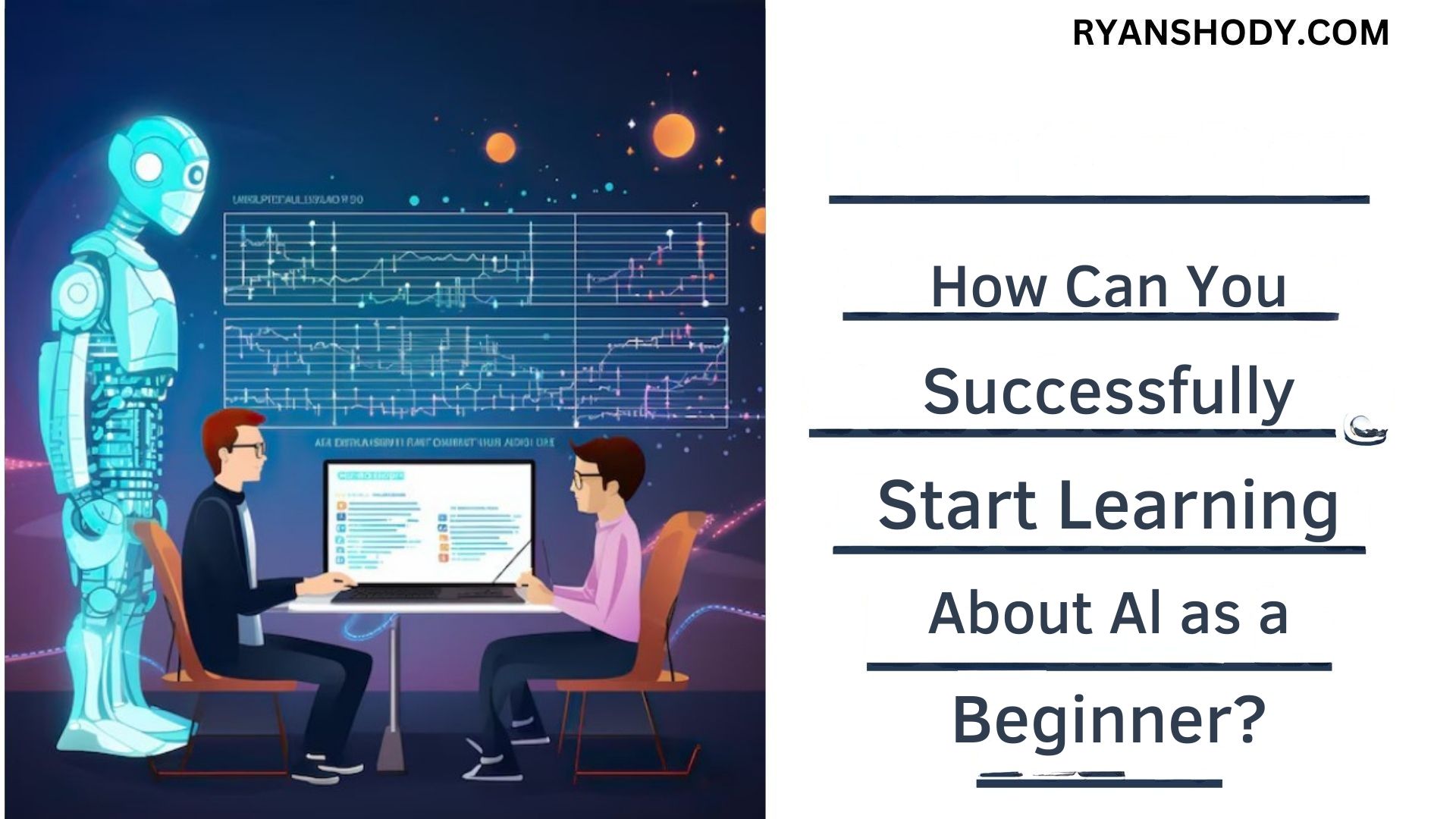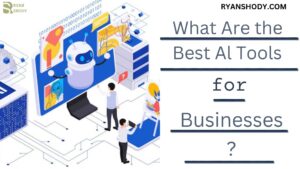In 2025, Learning About AI as a Beginner is an exciting journey that opens doors to endless possibilities in technology.
AI, or Artificial Intelligence, is rapidly becoming a part of our daily lives, influencing everything from the apps we use to the way businesses operate.

As more industries adopt AI, the demand for people who understand and can work with AI is growing.
Whether you’re just curious about AI or you’re looking to build a career in this field, starting now can give you a head start.
This guide is here to help you begin Learning About AI as a Beginner and provide you with the tools and knowledge to succeed.
What Is Learning About AI as a Beginner?
Learning About AI as a Beginner means starting from the ground up to understand what AI is and how it works.
AI is a branch of computer science focused on building machines that can think and learn like humans.
For beginners, this involves understanding the basics, like how machines can be trained to recognize patterns, make decisions, and even understand human language.
As you progress, you’ll learn about different AI technologies and how they’re used in real-world applications.
The journey starts with grasping the core ideas and then gradually diving into more complex concepts.
Verdict
For those embarking on the journey of Learning About AI as a Beginner, 2025 offers a wealth of resources and tools that make the process more accessible than ever.
By starting with the basics and gradually building your knowledge, you can successfully integrate AI into your personal or professional life.

Whether you’re learning for personal interest or aiming to develop a career in AI, the key is to remain curious, patient, and consistent in your learning efforts.
AI is not just a fleeting trend; it’s a transformative technology with long-term relevance.
Beginning now will position you well for future opportunities.
Why Should Beginners Learn AI?
Learning About AI as a Beginner is not only about acquiring new skills but also about opening doors to numerous opportunities.
Here’s why it’s worth the effort:

1. The Growing Demand for AI Skills in the Job Market
AI is revolutionizing various industries, from healthcare to finance, and companies are in desperate need of people who understand AI.
Jobs in AI are not just limited to tech companies; businesses across all sectors are looking for AI expertise to improve efficiency, make better decisions, and stay competitive.
By starting to learn AI now, you’ll be preparing yourself for a future where these skills are highly sought after.
2. How AI Knowledge Can Benefit Personal and Professional Growth
Understanding AI can significantly enhance your ability to solve problems creatively and think critically.
In your personal life, AI skills can help you automate routine tasks, analyze data, and even create your own AI-powered projects.
Professionally, AI knowledge can make you a valuable asset in any company, leading to better job opportunities, higher salaries, and career advancement.
3. Future Prospects and Career Opportunities in AI
AI is not just a short-term trend; it’s expected to continue growing for decades. Careers in AI are diverse and include roles like data scientist, machine learning engineer, AI researcher, and AI product manager.
These roles offer not only high salaries but also the chance to work on cutting-edge technologies that could shape the future.
Whether you want to work for a top tech company, start your own business, or contribute to research, AI offers limitless possibilities.
AI Basics: Key Concepts and Terminology
Before diving deep into AI, it’s important for beginners to grasp the fundamental concepts:
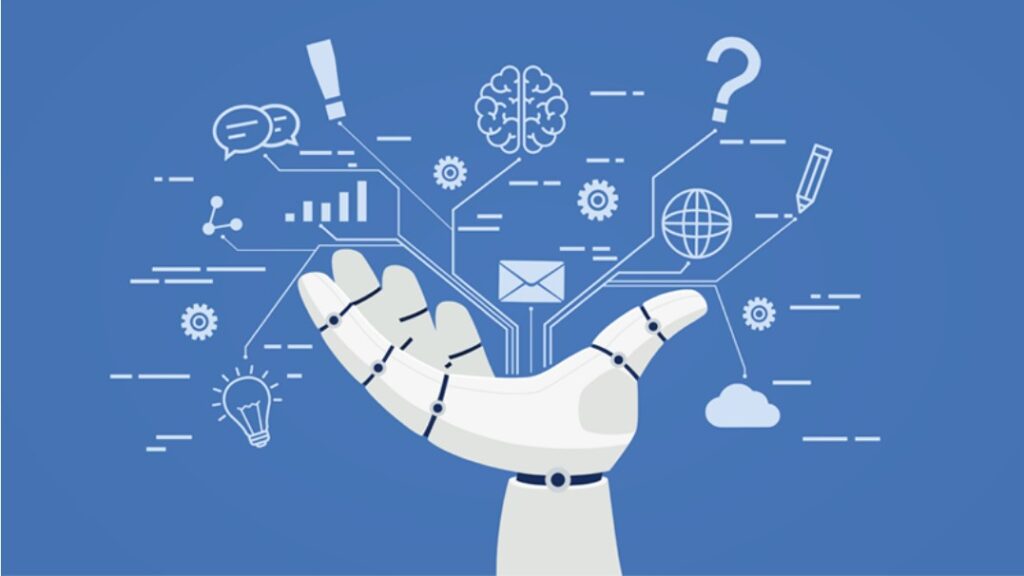
1. Explanation of Fundamental AI Concepts Such as Algorithms, Machine Learning, and Neural Networks:
At its core, AI is about creating algorithms, which are sets of rules or instructions that tell a computer what to do.
Machine learning is a type of AI that allows computers to learn from data, improving their performance over time without being explicitly programmed.
Neural networks are a set of algorithms modeled after the human brain, helping machines recognize patterns and make decisions in a way that mimics human thinking.
2. Understanding Supervised and Unsupervised Learning:
Machine learning can be split into two main types: supervised and unsupervised learning. In supervised learning, the machine is trained on a dataset where the correct answers are provided.
For example, if you wanted to teach a machine to recognize pictures of cats, you would provide it with a set of images labeled as “cat” or “not cat.”
In unsupervised learning, the machine is given data without labels and must find patterns or groupings on its own, like clustering similar customer profiles together.
3. Introduction to Natural Language Processing (NLP) and Computer Vision:
NLP is the branch of AI that helps machines understand and process human language.
It’s what allows chatbots to answer questions and voice assistants like Siri to respond to voice commands.
Computer vision, on the other hand, allows machines to interpret and understand visual information from the world, like recognizing faces in photos or reading text from images.
Essential Tools and Platforms for Learning AI
To effectively learn AI, beginners need access to the right tools and platforms.
Here’s a breakdown of some of the most popular and useful options, helping you succeed in Learning About AI as a Beginner.
Overview of Popular AI Learning Platforms
1. Coursera

Why It Is Important: Coursera is a crucial platform for Learning About AI as a Beginner because it offers courses from top universities and companies around the world.
The platform provides structured learning paths, allowing beginners to start with the basics and gradually progress to more advanced topics, all while earning certificates that can boost their credentials.
Strong Verdict: Coursera stands out as one of the best platforms for Learning About AI as a Beginner, thanks to its high-quality content and the opportunity to learn from industry leaders.
Whether you’re just starting or looking to advance your skills, Coursera offers a well-rounded education in AI.
Features:
- Courses from prestigious universities and institutions.
- Certification options to enhance your resume.
- Wide range of AI topics from basics to advanced levels.
- Flexible learning with self-paced and scheduled courses.
Pros and Cons:
- Pros:
- Access to top-quality education from renowned institutions.
- Certifications that are recognized by employers.
- Variety of courses catering to different levels of expertise.
- Cons:
- Some courses require payment to access full content and certificates.
- Can be overwhelming due to the vast number of courses available.
User Experience:
- Ease of Use: The platform is user-friendly, with a clear course structure.
- Content Quality: High-quality videos, quizzes, and peer-graded assignments.
- Support: Active discussion forums and access to course instructors.
2. Udemy

Why It Is Important: Udemy is important for Learning About AI as a Beginner because it offers a wide range of affordable courses, making AI education accessible to everyone.
The platform’s lifetime access policy allows learners to revisit content whenever they need, which is crucial for mastering complex AI concepts.
Strong Verdict: Udemy is an excellent platform for budget-conscious learners who want access to a variety of AI courses.
With its lifetime access feature, it’s a go-to resource for continuous learning and skill reinforcement, making it perfect for Learning About AI as a Beginner.
Features:
- Affordable pricing with frequent discounts.
- Lifetime access to purchased courses.
- Wide selection of AI courses catering to different needs.
- Mobile app for learning on the go.
Pros and Cons:
- Pros:
- Affordable courses with frequent sales and discounts.
- Lifetime access to course materials.
- Diverse range of courses for different levels and interests.
- Cons:
- Course quality can vary since anyone can create and sell courses.
- Lack of structured learning paths compared to other platforms.
User Experience:
- Ease of Use: Simple, intuitive interface with easy navigation.
- Content Quality: Varies by instructor, but generally good with ratings and reviews.
- Support: Q&A section for each course and direct messaging with instructors.
3. edX

Why It Is Important: edX is important for Learning About AI as a Beginner because it offers high-quality AI courses from top universities and companies.
The platform provides a blend of academic rigor and practical skills, making it ideal for those who want a deep understanding of AI concepts backed by credentials from reputable institutions.
Strong Verdict: edX is a premier platform for learners seeking a balance between academic rigor and practical skills.
Its courses, often accompanied by certificates, are perfect for those serious about Learning About AI as a Beginner and advancing their knowledge.
Features:
- Courses from top universities like MIT and Harvard.
- Professional certificates and MicroMasters programs.
- Self-paced and instructor-led course options.
- Integration with corporate partners for professional development.
Pros and Cons:
- Pros:
- High-quality education from prestigious institutions.
- Options for formal certification, including MicroMasters.
- Self-paced learning to fit around your schedule.
- Cons:
- Some certifications can be expensive.
- Limited interaction with instructors in self-paced courses.
User Experience:
- Ease of Use: Professional interface with a focus on academic learning.
- Content Quality: Top-notch content with rigorous academic standards.
- Support: Comprehensive support including forums and direct contact with instructors.
4. Khan Academy

Why It Is Important: Khan Academy is a key platform for Learning About AI as a Beginner due to its comprehensive and free educational resources.
It’s particularly useful for those who need to build a strong foundation in mathematics and computer science before diving into AI-specific topics.
Strong Verdict: Khan Academy is an invaluable resource for absolute beginners who need to build foundational skills before tackling AI.
Its free, high-quality content makes Learning About AI as a Beginner accessible to everyone, regardless of their financial situation.
Features:
- Completely free access to all educational content.
- Extensive coverage of fundamental subjects like math and computer science.
- Interactive exercises and quizzes to reinforce learning.
- Personalized learning dashboard to track progress.
Pros and Cons:
- Pros:
- Free access to a wide range of educational content.
- Great for building foundational knowledge necessary for AI.
- User-friendly interface with interactive elements.
- Cons:
- Limited to foundational subjects; not as many advanced AI-specific courses.
- No certification or formal recognition of learning.
User Experience:
- Ease of Use: Extremely user-friendly with a focus on clarity and simplicity.
- Content Quality: High-quality, well-explained content suitable for beginners.
- Support: Interactive exercises and instant feedback on quizzes.
Introduction to AI Development Tools
1. TensorFlow
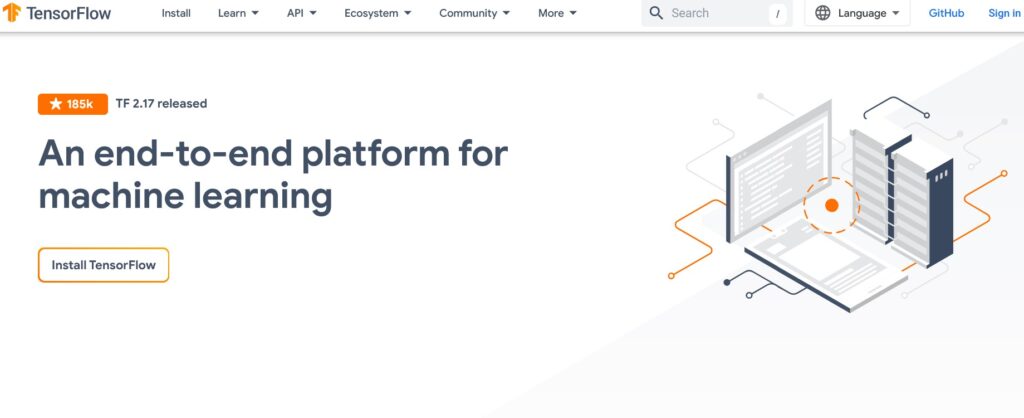
Why It Is Important:
TensorFlow is a critical tool for Learning About AI as a Beginner due to its extensive capabilities for building and deploying machine learning models.
It’s widely used in both industry and research, making it an essential tool for anyone serious about AI.
Strong Verdict:
TensorFlow is a must-learn tool for AI enthusiasts and professionals alike.
Its power and versatility make it the backbone of countless AI projects, from simple models to complex neural networks, making it a cornerstone in Learning About AI as a Beginner.
Features:
- Open-source platform with a large community of contributors.
- Support for building and deploying machine learning models.
- Integration with various programming languages, primarily Python.
- Tools for visualization (TensorBoard) and easy model deployment.
Pros and Cons:
Pros:
- Extremely powerful and versatile for all kinds of AI projects.
- Supported by a large, active community, with plenty of resources available.
- Extensive documentation and tutorials available.
Cons:
- Steeper learning curve compared to some other AI tools.
- Can be resource-intensive, requiring significant computing power for larger models.
User Experience:
- Ease of Use: May require some effort to learn, especially for beginners.
- Content Quality: High-quality tutorials and documentation to support learning.
- Support: Strong community support with numerous online forums and resources.
2. PyTorch

Why It Is Important:
PyTorch is essential for Learning About AI as a Beginner because of its flexibility and ease of use, making it particularly popular in the research community.
It allows developers to experiment quickly and efficiently, which is crucial in the fast-evolving field of AI.
Strong Verdict:
PyTorch is an ideal choice for AI researchers and developers who need a tool that is both powerful and adaptable.
Its user-friendly interface and dynamic computational graph make it a standout in Learning About AI as a Beginner.
Features:
- Dynamic computational graph that allows for more flexibility during model development.
- Strong support for GPU acceleration, speeding up computations.
- Extensive ecosystem with libraries for computer vision, NLP, and more.
- Seamless integration with Python, making it intuitive for Python developers.
Pros and Cons:
- Pros:
- Flexible and easy to use, especially for experimentation.
- Excellent support for dynamic neural networks.
- Active community and strong research-oriented ecosystem.
- Cons:
- Less mature for production deployment compared to TensorFlow.
- Documentation is extensive but can be overwhelming for beginners.
User Experience:
- Ease of Use: Intuitive for those familiar with Python, but with a learning curve.
- Content Quality: High-quality resources, though sometimes more research-focused.
- Support: Strong community support, especially among researchers.
3. Jupyter Notebooks

Why It Is Important:
Jupyter Notebooks are crucial for Learning About AI as a Beginner because they provide an interactive environment that allows developers to write code, visualize data, and document their process all in one place.
This is particularly useful for both learning and experimentation.
Strong Verdict:
Jupyter Notebooks are an indispensable tool for AI developers and learners alike, offering a seamless way to combine coding, data analysis, and documentation, all in one user-friendly interface, making them a key part of Learning About AI as a Beginner.
Features:
- Interactive environment that supports over 40 programming languages.
- Integration with popular AI libraries like TensorFlow and PyTorch.
- Rich media support, allowing for text, images, and visualizations.
- Open-source and highly extensible with various plugins and extensions.
Pros and Cons:
- Pros:
- User-friendly interface perfect for learning and prototyping.
- Rich support for visualizations and documentation within the same environment.
- Extensible with plugins for added functionality.
- Cons:
- Not ideal for large-scale production environments.
- Can be resource-intensive, particularly with large datasets or complex models.
User Experience:
- Ease of Use: Extremely user-friendly, especially for beginners and those familiar with Python.
- Content Quality: Supports rich content, making it excellent for learning and teaching.
- Support: Large community with many extensions and plugins available.
4. Google Colab

Why It Is Important:
Google Colab is important for Learning About AI as a Beginner because it offers a cloud-based environment for running Jupyter Notebooks without the need for any local setup.
It’s particularly valuable for AI learners and developers who don’t have access to high-powered computing resources, as it provides free access to GPUs.
Strong Verdict:
Google Colab is an invaluable tool for AI enthusiasts who need access to powerful computing resources without the hassle of setup.
Its cloud-based nature makes it accessible and convenient for anyone interested in Learning About AI as a Beginner.
Features:
- Free access to GPUs for accelerated AI development.
- Cloud-based, no installation required, with easy access from any device.
- Integration with Google Drive for easy file management and sharing.
- Supports all Jupyter Notebook features, with added collaboration tools.
Pros and Cons:
- Pros:
- Free and easy access to powerful computational resources.
- Cloud-based, so no need for a powerful local machine.
- Collaboration-friendly, allowing multiple users to work on the same notebook.
- Cons:
- Limited to 12 hours of continuous usage per session.
- Dependent on internet access, with potential downtime or slowness.
User Experience:
- Ease of Use: Very easy to use, especially for those familiar with Jupyter Notebooks.
- Content Quality: Supports rich content and interactive features, ideal for learning and development.
- Support: Extensive documentation and community support, with Google’s backing.
Recommendations for AI Programming Languages
1. Python
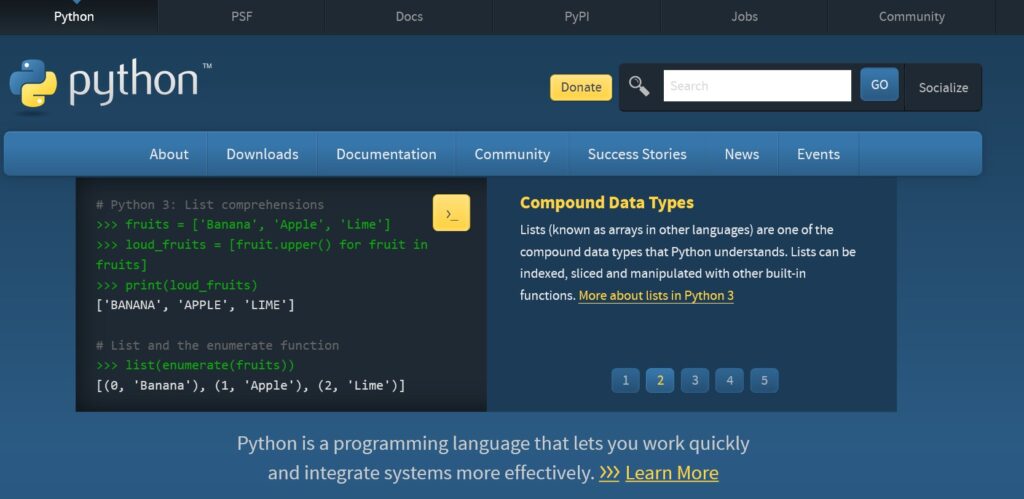
Why It Is Important:
Python is the most important programming language for Learning About AI as a Beginner due to its simplicity and extensive library support.
It’s widely used in the AI community for everything from data analysis to developing complex machine learning models, making it a must-learn for anyone entering the field.
Strong Verdict:
Python is the cornerstone of AI development.
Its ease of use, combined with powerful libraries and a strong community, makes it the best choice for Learning About AI as a Beginner and for both beginners and experienced developers looking to work in AI.
Features:
- Simple syntax that’s easy to learn and understand.
- Extensive libraries like NumPy, Pandas, TensorFlow, and PyTorch.
- Strong community support with a vast number of tutorials and resources.
- Cross-platform compatibility, running on Windows, macOS, and Linux.
Pros and Cons:
- Pros:
- Simple and easy to learn, making it accessible for beginners.
- Extensive support for AI and data science libraries.
- Strong community and abundance of learning resources.
- Cons:
- Not the fastest language for execution, especially in large-scale applications.
- Dependency management can be challenging with multiple libraries.
User Experience:
- Ease of Use: Extremely easy to learn, especially for beginners.
- Content Quality: Rich ecosystem with high-quality libraries and resources.
- Support: Unmatched community support with endless tutorials, forums, and documentation.
2. R

Why It Is Important:
R is crucial for Learning About AI as a Beginner, particularly in data analysis and statistical computing.
It’s widely used in academia and industry for its powerful capabilities in handling and analyzing large datasets, making it an excellent choice for AI projects that require deep statistical analysis.
Strong Verdict:
R is an indispensable tool for AI projects that involve complex data analysis.
Its robust statistical capabilities and vast package ecosystem make it a go-to choice for data scientists and researchers in Learning About AI as a Beginner.
Features:
- Powerful statistical and data analysis capabilities.
- Comprehensive package ecosystem with libraries like ggplot2 and caret.
- Strong community support, especially in academia.
- Integration with popular data visualization tools.
Pros and Cons:
- Pros:
- Excellent for data-heavy AI projects requiring statistical analysis.
- Strong support for data visualization with extensive libraries.
- Well-supported in academic and research settings.
- Cons:
- Steeper learning curve compared to Python.
- Less support for general-purpose programming and web development.
User Experience:
- Ease of Use: More challenging to learn, especially for beginners.
- Content Quality: High-quality libraries and tools for data analysis.
- Support: Strong support within the data science community, but less widespread outside of it.
3. Julia
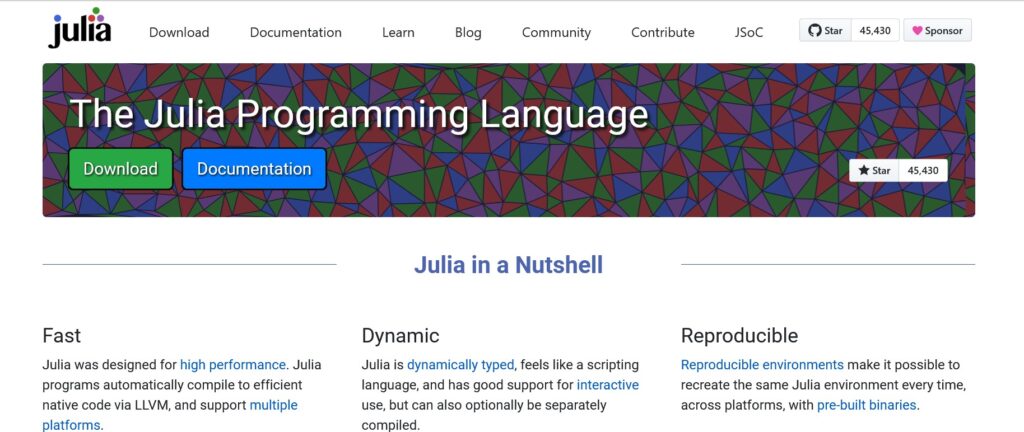
Why It Is Important:
Julia is important for Learning About AI as a Beginner because it offers high performance and efficiency, especially in large-scale data processing.
It’s a newer language that’s gaining traction for its speed and ease of use, making it a strong candidate for AI tasks that require heavy computational power.
Strong Verdict:
Julia is an excellent choice for AI developers who need a language that combines high performance with ease of use.
It’s particularly well-suited for large-scale AI projects where execution speed is critical, making it a powerful tool in Learning About AI as a Beginner.
Features:
- High-performance language designed for speed and efficiency.
- Strong support for numerical and scientific computing.
- Interoperability with Python, allowing the use of Python libraries within Julia.
- Growing ecosystem with packages for AI, machine learning, and data science.
Pros and Cons:
- Pros:
- Fast execution speed, making it ideal for large-scale AI projects.
- Interoperability with Python, enhancing its versatility.
- Increasing support and growing community.
- Cons:
- Smaller community and fewer resources compared to Python.
- Learning curve can be steep for those unfamiliar with numerical computing.
User Experience:
- Ease of Use: More complex, but highly rewarding for those with prior programming experience.
- Content Quality: Growing number of high-quality libraries and resources.
- Support: Smaller community but rapidly growing, with strong support from academia.
4. Java

Why It Is Important:
Java is significant in Learning About AI as a Beginner, particularly for building large-scale machine learning applications.
It’s widely used in enterprise environments and offers robust tools for handling big data, making it a solid choice for AI projects that need to be scalable and secure.
Strong Verdict:
Java remains a powerful tool in the AI toolkit, especially for developers working on enterprise-level applications.
Its robustness and scalability make it a reliable choice for serious AI development, making it a key language in Learning About AI as a Beginner.
Features:
- Strong support for enterprise-level applications and big data processing.
- Extensive library ecosystem for AI and machine learning, including Weka and Deeplearning4j.
- High performance and scalability for large AI projects.
- Cross-platform capabilities, making it versatile across different systems.
Pros and Cons:
- Pros:
- Excellent for building scalable, secure AI applications.
- Strong support for big data processing and enterprise use cases.
- Long-standing community with extensive resources.
- Cons:
- More complex and challenging to learn compared to languages like Python.
- Slower development speed due to more verbose syntax.
User Experience:
- Ease of Use: More challenging due to its complexity and verbose syntax.
- Content Quality: Extensive libraries and resources, particularly for enterprise applications.
- Support: Strong community support, especially in enterprise and big data contexts.
Beginner-Friendly AI Projects
One of the best ways to learn AI is by working on projects:
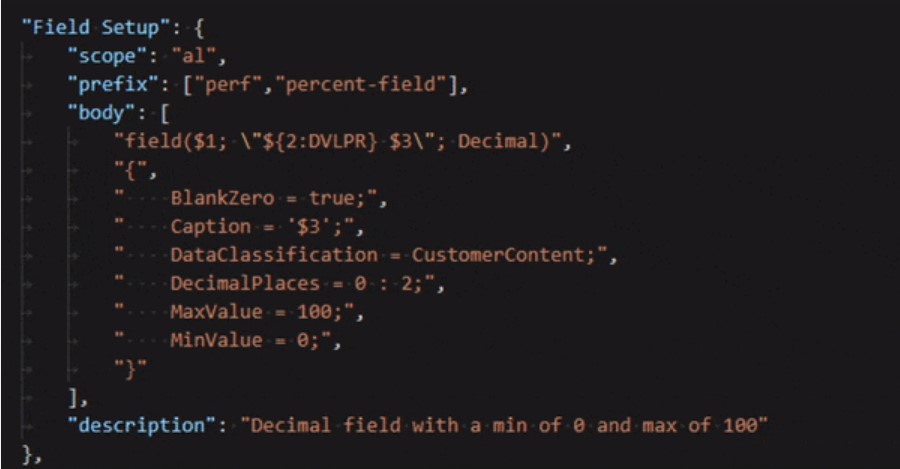
1. Ideas for Simple AI Projects That Beginners Can Try
Starting with small, manageable projects is a great way to apply what you’ve learned.
For instance, you could build a simple chatbot that can respond to basic questions, or create a recommendation system that suggests products based on user preferences.
Another project could be analyzing sentiment in social media posts, where you train a model to detect whether a comment is positive, negative, or neutral.
2. Step-by-Step Guides to Building Basic AI Models
To help you get started, follow a detailed guide on building a basic machine learning model, like a linear regression model that predicts housing prices based on features like location and size.
This project will teach you how to gather and clean data, train a model, and evaluate its performance.
As you get more comfortable, you can move on to more complex projects.
3. Importance of Hands-On Practice in Learning AI
Theory is important, but nothing beats the experience of building something from scratch.
Hands-on practice helps reinforce what you’ve learned, and it gives you a sense of accomplishment when you see your model in action.
Plus, working on projects helps you build a portfolio, which can be useful when you’re looking for a job or freelance opportunities in AI.
Resources for Learning AI
Finding the right resources can significantly impact your AI learning journey:

1. Top Online Courses and Certifications for AI Beginners
If you’re just starting, taking a structured course can provide a clear learning path.
Courses like Andrew Ng’s “Machine Learning” on Coursera are highly recommended because they’re taught by industry experts and cover foundational concepts in an accessible way.
Certifications can also add value to your resume, showing potential employers that you’ve committed time and effort to learning AI.
2. Recommended Books and Tutorials on AI
Books like “Artificial Intelligence: A Modern Approach” by Stuart Russell and Peter Norvig are considered the gold standard for AI education.
They cover a wide range of topics and are suitable for both beginners and those with some experience.
For more hands-on learning, tutorials available on sites like Towards Data Science or Medium can help you apply concepts through coding exercises.
3. Free and Paid Resources for AI Learning
Not all learning resources have to cost money.
There are many free resources available, such as YouTube channels, open-source projects on GitHub, and free online courses.
While paid courses and books often offer more structure and depth, free resources can complement your learning and help you explore topics at your own pace.
Common Challenges and How to Overcome Them
Learning About AI as a Beginner can be challenging, but these challenges can be overcome:

1. Common Obstacles Faced by Beginners When Learning AI
As you start learning AI, you may encounter concepts that are difficult to grasp, like calculus, linear algebra, or programming.
These subjects form the backbone of AI, but they can be intimidating if you don’t have a strong background in them.
Additionally, the sheer volume of information available can be overwhelming, making it hard to know where to start or what to focus on.
2. Tips for Staying Motivated and Consistent in Learning
One of the best ways to stay motivated is to set small, achievable goals. Instead of trying to learn everything at once, focus on mastering one concept at a time.
Joining online AI communities or study groups can also provide support and encouragement, helping you stay on track.
Participating in challenges like Kaggle competitions can add a fun, competitive element to your learning, keeping you engaged.
3. How to Find a Community or Mentor for Support
Finding others who are also Learning About AI as a Beginner can make the journey less daunting.
Look for online forums like Reddit’s r/MachineLearning, join AI-focused LinkedIn groups, or attend local meetups and workshops.
A mentor who has experience in AI can also provide valuable guidance, helping you navigate challenges and offering advice based on their own experiences.
Case Studies: Success Stories of Beginners Learning AI
Learning from others’ experiences can be incredibly motivating

3. Real-Life Examples of People Who Started Learning AI and Found Success
Many people have successfully transitioned into AI from non-technical backgrounds.
For instance, you might read about a marketing professional who started learning AI to better understand customer data and eventually became a data scientist.
Another example could be a teacher who learned AI to incorporate personalized learning tools in their classroom, enhancing student outcomes.
2. Lessons Learned from Their Experiences
These success stories often highlight the importance of persistence and curiosity.
The individuals who succeeded didn’t just rely on formal education; they explored projects on their own, sought out mentors, and continuously challenged themselves.
By learning from their experiences, you can adopt similar strategies and mindset to overcome challenges in your own AI learning journey.
3. Inspiration and Encouragement for Other Beginners
Hearing about others who started from scratch and achieved success can be incredibly inspiring.
It shows that with dedication and the right approach, you too can master AI and open up new opportunities for yourself, whether in your current field or in a new career.
Verdict: Is Learning AI Worth It for Beginners?
Learning About AI as a Beginner is undoubtedly worth it.
The skills you acquire will not only be valuable in the current job market but will also prepare you for future technological advancements.
While the journey may be challenging, the rewards, both personally and professionally, are immense.

AI is the future, and starting to learn it now puts you ahead of the curve. Whether you’re looking to improve your current career prospects or explore a new field, AI offers a path full of opportunities.
Frequently Asked Questions (Learning About AI as a Beginner)
Q1: How long does it take to start learning about AI as a beginner?
A1: The time it takes to start Learning About AI as a Beginner varies depending on your background and how much time you can dedicate to learning. If you have some programming experience, you might start grasping the basics within a few months.
Q2: What are the best resources for beginners learning about AI?
A2: Some of the best resources for Learning About AI as a Beginner include online courses like Andrew Ng’s “Machine Learning” on Coursera, books like “Artificial Intelligence: A Guide for Thinking Humans,” and hands-on projects that you can find on GitHub.
Q3: Do I need a background in programming to learn AI?
A3: While a programming background can be helpful, it’s not a strict requirement to start Learning About AI as a Beginner. Many introductory courses start with the basics of programming, especially in Python, which is widely used in AI.
Q4: How can AI be applied in everyday life?
A4: AI can be applied in everyday life in various ways. Personal assistants like Siri and Alexa use AI to understand and respond to your voice commands. Recommendation systems on platforms like Netflix or Amazon use AI to suggest movies or products based on your preferences.
Q5: What career opportunities are available after learning AI?
A5: Once you’ve succeeded in Learning About AI as a Beginner, a wide range of career opportunities becomes available. You could become a data scientist, machine learning engineer, AI researcher, or even an AI consultant.

